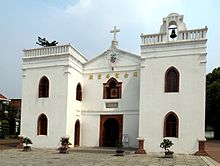(Chinese : 臺灣基督教) | |
|---|---|
 Catholic Church of Wanchin | |
| Total population | |
| 6.8% (2021 census) | |
| Languages | |
| Chinese languages(Mandarin, Hokkien, Hakka) Formosan languages, Malayo-Polynesian languages(Tao, Filipino, Indonesian) Japanese, Dutch, Spanish, English | |
| Religion | |
| Catholicism, Protestantism, Eastern Orthodoxy, Nontrinitarianism |


Christianity in Taiwan constituted 3.9% of the population, according to the census of 2005;[1] Christians on the island included approximately 600,000 Protestants, 300,000 Catholics and a small number of members of the Church of Jesus Christ of Latter-day Saints.
Estimates in 2020 suggested that the portion had risen to 4% or 6%.[2][3][4]
Due to the small number of practitioners, Christianity has not influenced the island nation's Han Chinese culture in a significant way. A few individual Christians have devoted their lives to charitable work in Taiwan, becoming well known and well liked—for example, George Leslie Mackay (Presbyterian) and Nitobe Inazō (Methodist, later Quaker).
A few presidents of Taiwan have been Christians, including Republic of China's founder Sun Yat-sen (Confucian-Congregationalist), Chiang Kai-shek and his son Chiang Ching-kuo (both Buddhist-Methodists), and Lee Teng-hui (Presbyterian). Ma Ying-jeou apparently received a Catholic baptism in his early teens but does not identify with any religion or with Chinese folk religion practices. At the same time, the Presbyterian Church in Taiwan has been a key supporter of human rights and the Democratic Progressive Party, a stance opposed to many of the politicians listed above.
- ^ "Taiwan Yearbook 2006". Taiwan Government Information Office, Department of Civil Affairs, Ministry of the Interior. 2006. Archived from the original on 8 July 2007.
- ^ The ARDA website, retrieved 2023-08-28
- ^ The Joshua Project, retrieved 2032-08-28
- ^ Washington Times website, article by Mark Kellmer dated August 12, 2022